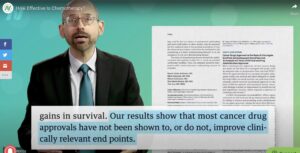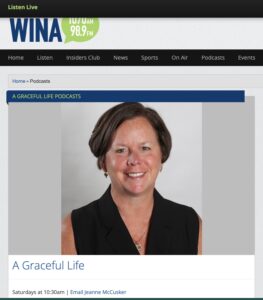Would you spend $100,000 on a cancer treatment with many painful side effects that might help you survive 6.24 months as opposed to 5.91? That is 10 days longer in greater pain and suffering?
What if the doctor told you just that “this treatment will help you survive longer”? This is a true statement even though you might only survive 5.6% longer. That IS longer.
 I have just discovered two great videos with Dr. Michael Greger discussing this very topic. Each video is less than seven minutes and worth every minute of your time. One is called “How Effective is Chemotherapy?” and the other is “How Much Does Chemotherapy Improve Survival?”
I have just discovered two great videos with Dr. Michael Greger discussing this very topic. Each video is less than seven minutes and worth every minute of your time. One is called “How Effective is Chemotherapy?” and the other is “How Much Does Chemotherapy Improve Survival?”
Let me be clear. I have no idea what I would do if I had a cancer diagnosis. I have close friends and family members who had advanced cancers and have been treated very successfully and are living active lives years after their treatments.
On the other hand, I have had patients, and, again, close friends and family members who received brutal chemotherapies and died. Many of those seemed to have received no benefit from their treatments and suffered great burdens. Many patients go bankrupt in order to pay for treatments.
Dr. Greger, in the first video says, “A large proportion of cancer patients reported their willingness to declare bankruptcy or sell their homes to pay for treatment. I mean, look, aren’t the high prices justified if new and innovative treatments offer significant benefits to patients? But you may be shocked to find out that many FDA-approved cancer drugs might lack clinical benefit.”
 In his second video he referred to a study reported in the Journal of the National Cancer Institute. “In fact, the most expensive drug they looked at, the one costing $169,836 a year, did not improve overall survival at all, and actually worsened quality of life. That’s $169,000 just to make you feel worse with no benefit. Why pay a penny for a treatment that doesn’t actually help?”
In his second video he referred to a study reported in the Journal of the National Cancer Institute. “In fact, the most expensive drug they looked at, the one costing $169,836 a year, did not improve overall survival at all, and actually worsened quality of life. That’s $169,000 just to make you feel worse with no benefit. Why pay a penny for a treatment that doesn’t actually help?”
I am NOT giving medical advice here. I am encouraging all of us to ask questions of our physicians. If a recommended therapy is said to improve survival, ask, “How much improvement?” Is it just 10 days over six months while suffering uncomfortable side effects? Ask about cost. Would I be willing to spend my financial legacy for those 10 days?
This all reminds me of the importance of our own emotional and spiritual preparation for dying. When “our time” comes we will be ready to die… or be healed. Either way, we’re okay.
________________________________________
Cover Photo by Marcelo Leal on Unsplash
Chaplain Hank Dunn is the author of Hard Choices for Loving People: CPR, Feeding Tubes, Palliative Care, Comfort Measures and the Patient with a Serious Illness and Light in the Shadows. Together they have sold over 4 million copies. You can purchase his books at hankdunn.com or on Amazon.


 Another change in the last 40 years has been the increased use of advance directive documents like living wills and durable powers of attorney for healthcare. About half the adult population now has such papers.
Another change in the last 40 years has been the increased use of advance directive documents like living wills and durable powers of attorney for healthcare. About half the adult population now has such papers.